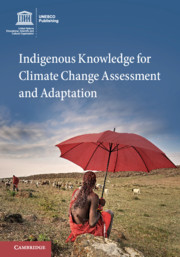Book contents
- Indigenous Knowledge for Climate Change Assessment and Adaptation
- Indigenous Knowledge for Climate Change Assessment and Adaptation
- Copyright page
- Contents
- Contributors
- Foreword
- Acknowledgements
- Abbreviations
- 1 Indigenous Knowledge for Climate Change Assessment and Adaptation: Introduction
- Part I Knowing our Weather and Climate
- Part II Our Changing Homelands
- 7 Indigenous Forest Management as a Means for Climate Change Adaptation and Mitigation
- 8 Indigenous Knowledge, History and Environmental Change as Seen by Yolngu People of Blue Mud Bay, Northern Australia
- 9 Coping with Climate: Innovation and Adaptation in Tibetan Land Use and Agriculture
- 10 Seasonal Environmental Practices and Climate Fluctuations in Island Melanesia: Transformations in a Regional System in Eastern Papua New Guinea
- 11 Traditional Knowledge and Crop Varieties as Adaptation to Climate Change in South-West China, the Bolivian Andes and Coastal Kenya
- Part III Confronting Extreme Events
- Part IV Sources of Indigenous Strength and Resilience
- Index
- References
11 - Traditional Knowledge and Crop Varieties as Adaptation to Climate Change in South-West China, the Bolivian Andes and Coastal Kenya
from Part II - Our Changing Homelands
Published online by Cambridge University Press: 13 September 2018
- Indigenous Knowledge for Climate Change Assessment and Adaptation
- Indigenous Knowledge for Climate Change Assessment and Adaptation
- Copyright page
- Contents
- Contributors
- Foreword
- Acknowledgements
- Abbreviations
- 1 Indigenous Knowledge for Climate Change Assessment and Adaptation: Introduction
- Part I Knowing our Weather and Climate
- Part II Our Changing Homelands
- 7 Indigenous Forest Management as a Means for Climate Change Adaptation and Mitigation
- 8 Indigenous Knowledge, History and Environmental Change as Seen by Yolngu People of Blue Mud Bay, Northern Australia
- 9 Coping with Climate: Innovation and Adaptation in Tibetan Land Use and Agriculture
- 10 Seasonal Environmental Practices and Climate Fluctuations in Island Melanesia: Transformations in a Regional System in Eastern Papua New Guinea
- 11 Traditional Knowledge and Crop Varieties as Adaptation to Climate Change in South-West China, the Bolivian Andes and Coastal Kenya
- Part III Confronting Extreme Events
- Part IV Sources of Indigenous Strength and Resilience
- Index
- References
- Type
- Chapter
- Information
- Publisher: Cambridge University PressPrint publication year: 2018
References
- 2
- Cited by



